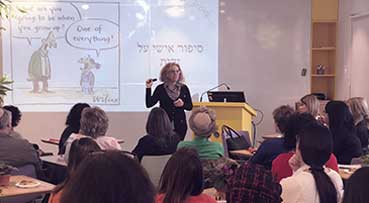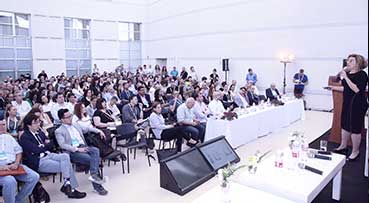Most of the time we think in terms of big systems: organizations, managers, workers, processes. But once in a while a conversation comes along and brings it down to the very personal level, the you and me. That’s when you get that the system is you. One of my managers used to tell the story about how he always complained about management this and management that, until it hit him that he was “management”. So this post wants to keep us a little while longer in that space, where even if we try to hide behind big system words, reminds us that what we do every day is about people, also at work. Especially at work…
Most organizations expect people to show up at work in a very particular way. We wear a mask, the one the organization expects of us, so much that we sometimes forget it is there. We are used to living within that identity, the professional one, looking right, appropriate, whatever is expected of our profession, for our promotion, from our organization. At work we rarely leave space for conversation about feelings, dreams, needs. Most of the time we live in a world of solutions, decisions, expectations. We’ve learned that our rational sides are valued at work. Our emotional, intuitive, maybe even spiritual sides don’t belong with out professional identity. Values like caring, questioning, vulnerability, these don’t help promote us up the corporate ladder, which is probably why most of us don’t allow them to show. In other words, we don’t bring all of who we are to work, we leave parts of ourselves outside. Why is it important? Because it is precisely those parts that make us creative, emotionally connected to work. They are what make us Humans as opposed to Machines.
Is it possible to invite all of who we are into the organization? Do our organizational processes, the way we hire, our meetings, our performance evaluations, do all those allow a safe space to invite all employees to show up without a mask? Allow them to be who they really are?
Think about the meetings in your organization. Are they about the topic, goal, strategy? Or are they too many times about egos, the need of those around the table to be heard, seen, win the argument? Something about meetings enables our egos to take first place, so we don’t look weak or stupid in front of our peers. An interesting example of how to get around egos in meetings can be found in Heiligenfeld, a mental health service provider in Germany. With over 600 employees, this organization chose to design its culture to enhance trust and reduce conflict. One of their most interesting practices is a chime in conference rooms, enabling every meeting participant to stop the conversation if they feel someone is speaking from ego and not for purpose. Sounding the chime will lead to a minute of silence and reflection. I couldn’t help but think of all those meetings I’ve attended where that kind of practice wouldn’t have left much time for conversation… And so the question remains, why is it so hard for us to adopt organizational processes that will open the door and invite us to be fully present?
Peter Drucker said decades ago that organizations need values just as the body needs vitamins. Without something to stand for, the organization is likely to end up lost. In his book, Dov Seidman calls it the “HOW”. How we do something is more important in the new world of work, where power will come from people, not from controlling people. Dov tells the story of 9 year old Martha Payne from Scottland, who blogged about the unhealthy food at her school cafeteria. In a month, that post had 3 million followers, 10 million on a year. Martha’s blog did change the cafeteria menu but more than that, it represents the power of the individual in a connected world. And if you’re wondering how this relates to work, in her blog Martha gives us the answer when she herself write: “I am the future workforce leader”.
The world of work is moving on from manual labor through knowledge work and onto the Human Economy, where the whole human being is at the center, mind, hands and heart. In a prior post “Managers in the Human Economy” we’ve already looked at how this changes the roles of managers and employees. From the industrial period, when people moved from agriculture into cities and factories, managers were there to manage the work, employees to do it. The knowledge economy of the past decades moved employees from factories into office buildings and instead of utilizing their hands made use of their minds. Manager roles evolved to run work processes and let workers have a larger say about how they did the work. According to the HBR article we are now in the middle of a new shift, from the knowledge economy to the human economy, which means we are going to employ not only the minds but also the hearts of our employees. And those hearts are precisely what brings creativity, passion, uniqueness, character, togetherness. In other words, the human workplace.
In the last few years we see more and more organizations focus no only on business objectives, but also on purpose. Many organizations try to include values and purpose in their internal and external conversations. But is that enough to connect employees and customers to the organization? Is this purpose reflected in the organizational processes? Take a look at how we go about driving to our objectives. In the past, leadership set the objectives and strategy and created work plans. This process treats the organization as if it were a system, one that needs to be programmed. We tell it where to go and how to get there, otherwise it will not move. That is why we create plans. For decades, the role of employees in this system was to do. Do with their hands in the factories, with their minds in the offices. Do what management set out for them.
The new generations in the workplace define work beyond making a living, they look for meaning, values, purpose. There are already quite a few organizations around the world whose only role is to help people find meaningful work, operating from the principle that society’s greatest challenges should get its best people, and vice versa. Organizations like On Purpose help employees in financial and consulting sectors move to civil service and social businesses. Escape the City created a community of over 200 thousand people who left corporate jobs and found meaningful work in what they define as 21st century careers, with a clearer sense of purpose and a bigger social impact.
And this is where we circle back to employee engagement and the fact that it has been steadily declining due to the gap between organizations and the hearts of their people. In the new world of work, the human world, we will have to solve this gap, create organizational systems where employees can bring all of themselves to work. We will not be able to treat humans as resources, one that needs to be managed for the needs of the organization. Workers, they are the organization, one where everyone works together to do that right thing, to fulfill the organizations purpose, a purpose which brings us together, a purpose which is worth investing in and achieving. Successful organizations will be those who will put humanity front and center and build off what only people can do.
It’s not a question of if, only when you will encounter this stress point in your world of work. The new generations will look at the carrot and stick processes with which we manage today in the same way we perceive people’s rote jobs at the assembly lines. To inspire people to bring their whole self to work, an organization will need to work for a worthy cause, one we will want to join, to contribute, to spend our time on. When people come together around values and meaning they stay together even when crisis hits. And no, there is nothing wrong with making money and profits, as long as they are not the sole purpose of our existence. If that is all you do, don’t be surprised your employees are not engaged.
In the human world of work we will not be able to separate between profit and reputation. We will not be able to hold a separate space for business, where the rules are different than those we adhere to with family and friends. We will not be able to stick to the famous quote from the Godfather: “It’s not personal, it’s just business”. The new world of work is personal.

![large-AX1A2125-2[1] large-AX1A2125-2[1]](https://niritcohen.com/wp-content/uploads/elementor/thumbs/large-AX1A2125-21-pnzedcs72atx5aeurqytqdiihxixlq02re9mlz805s.jpg)






